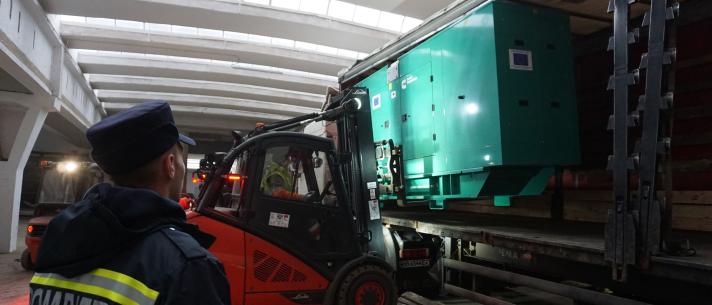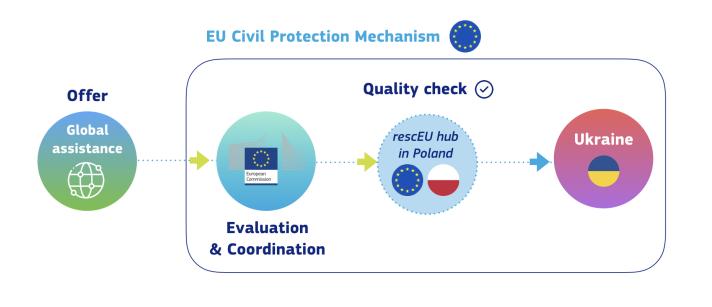The European Commission has set up an operational system to channel in-kind donations from third countries and the private sector to Ukraine, Moldova, and neighbouring EU countries. The aim is to help civilians affected by the war in Ukraine.
Via the EU Civil Protection Mechanism, the EU coordinates the overall donation process, from the expression of interest to the timely and safe delivery of donated items to local authorities.
The in-kind donations become a part of the rescEU reserve that the EU established to offer an additional layer of protection when disasters strike.
Who can donate?
- Private companies
- Public entities from inside and outside the EU
- Non-EU governmental institutions
Which items can be offered?
The European Commission is in direct contact with Ukrainian and neighbouring civil protection authorities to know the most urgently needed items on the ground.
Currently, we are collecting donations of the following items:
1. Emergency energy supply items
- High-voltage equipment
- Autotransformers
- Transformers
- Power generators
- Circuit breakers
- Wiring
- Gas turbines
- Other electrical equipment necessary for the repair and functioning of the energy and gas critical infrastructure.
2. Therapeutics and medicines– non-exhaustive list:
- Antibiotics
- Vaccines
- Antidotes
- Cancer treatment medicines
- Critical care medicines.
3. Medical devices
- Critical care and emergency equipment
- Hospital equipment
- Ambulances
- Pediatric items.
4. CBRN (chemical, biological, radiological, nuclear)
- Decontamination supplies
- Personal Protective Equipment
- Detection, identification, and monitoring devices
- Logistics support components.
5. Shelter items
- Insulated shelter units
- Sanitation and Hygiene facilities
- Heaters
- Hygiene kits
- Beds with mattresses and bedding items.
6. Transport and logistics
- Buses
- Trucks
- Excavators
- Forklifts
- Tractors
- Other vehicles and logistics items
7. Other items
- Passive protection (such as gabions and sandbags)
- Fire-fighting equipment
- Demining equipment.
How is the EU helping?
Entities can express their preliminary interest by filling out the offer form or contacting the European Commission Donations Team via ECHO-Donations@ec.europa.eu.
- Upon receiving a donation offer, the Commission evaluates it together with countries requesting assistance to match needs. This is to ensure that the most needed items receive priority for delivery.
- The donor receives an acceptance email with further instructions to arrange the delivery to a temporary warehouse.
- Following a quality check, the items will be transported to one of our logistical hubs in either Belgium or Poland. From there, the Commission will organise and financially cover the delivery of the items to Ukraine.
The operations are supported by the European Commission’s Health Emergency Preparedness and Response Authority (HERA).
They will be carried out in cooperation with the Governmental Strategic Reserves Agency of Poland (RARS), and the Energy Community Secretariat Ukraine Support Task Force (ECS-USTF)
More questions?
For further inquiries, please contact: ECHO-Donations@ec.europa.eu
Last updated: 17/04/2024


